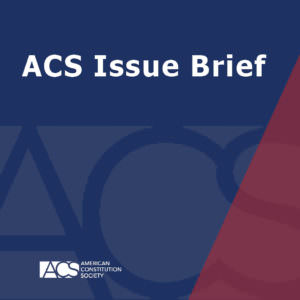Disorderly (mis)Conduct: The Problem with ‘Contempt of Cop’ Arrests
Distinguished Visitor from Practice, Georgetown Law
June 7, 2010
 ACS is pleased to distribute “Disorderly (mis)Conduct: The Problem with ‘Contempt of Cop’ Arrests,” an Issue Brief by Christy E. Lopez, a civil rights attorney with a practice focusing on police and criminal justice reform. Almost a year ago, the issue of "contempt of cop" arrests was thrust into the national news when Harvard University Professor Henry Louis Gates, Jr., was arrested by Cambridge Police Department Sergeant James Crowley. Sergeant Crowley was responding to a 911 caller who had reported a burglary in progress at Professor Gates's home, which is where the two encountered each other. As the events unfolded - Crowley's investigation of the burglary call and Gates's response to the Crowley's questions and actions - the situation escalated, and led to Sergeant Crowley arresting Professor Gates for disorderly conduct in the middle of the day just outside the front door to his house. The charges were later dropped, and after President Obama waded into the whole affair by saying that he thought the police acted "stupidly," the President later hosted a "beer summit" with both Gates and Crowley at the White House to help resolve the situation. Ms. Lopez argues that "Sergeant Crowley's decision to arrest Professor Gates may or may not have been stupid. It may or may not have been consistent with Cambridge Police Department policy. But, if the facts are as Crowley asserted in his arrest report, the arrest was unlawful." She describes the law, and contends that, however loud, rude, or obnoxious Gates was, his behavior "falls squarely in the realm of speech protected by the First Amendment," and he should not have been arrested. Ms. Lopez continues that, "[d]espite its illegality, the arrest of Professor Gates was not unusual.
ACS is pleased to distribute “Disorderly (mis)Conduct: The Problem with ‘Contempt of Cop’ Arrests,” an Issue Brief by Christy E. Lopez, a civil rights attorney with a practice focusing on police and criminal justice reform. Almost a year ago, the issue of "contempt of cop" arrests was thrust into the national news when Harvard University Professor Henry Louis Gates, Jr., was arrested by Cambridge Police Department Sergeant James Crowley. Sergeant Crowley was responding to a 911 caller who had reported a burglary in progress at Professor Gates's home, which is where the two encountered each other. As the events unfolded - Crowley's investigation of the burglary call and Gates's response to the Crowley's questions and actions - the situation escalated, and led to Sergeant Crowley arresting Professor Gates for disorderly conduct in the middle of the day just outside the front door to his house. The charges were later dropped, and after President Obama waded into the whole affair by saying that he thought the police acted "stupidly," the President later hosted a "beer summit" with both Gates and Crowley at the White House to help resolve the situation. Ms. Lopez argues that "Sergeant Crowley's decision to arrest Professor Gates may or may not have been stupid. It may or may not have been consistent with Cambridge Police Department policy. But, if the facts are as Crowley asserted in his arrest report, the arrest was unlawful." She describes the law, and contends that, however loud, rude, or obnoxious Gates was, his behavior "falls squarely in the realm of speech protected by the First Amendment," and he should not have been arrested. Ms. Lopez continues that, "[d]espite its illegality, the arrest of Professor Gates was not unusual.
This scenario - an individual being arrested after responding obstreperously to perceived police misconduct - is one that plays out routinely across the United States, albeit without the Ivy League backdrop or culminating in conflict-resolution-through-beer." In this Issue Brief, Ms. Lopez asserts that there is "widespread misunderstanding of police authority to arrest individuals who passively or verbally defy them" and that there is "abundant evidence that police overuse disorderly conduct and similar statutes to arrest people who 'disrespect' them or express disagreement with their actions." She believes that "abusive arrests cause direct and significant harm to those arrested and, more generally, undermine the appropriate balance between police authority and individual prerogative to question the exercise of that authority." To fully explore this issue, Ms. Lopez discusses the relevant law governing these types of arrests, and several investigations of problems in police departments around the country. She then details her reasons for asserting that "the harm caused by improper arrests and threats of arrest for disorderly conduct far outweighs the justification given by some police and pundits for the aggressive (overly-aggressive, some would say) use of these statutes," and concludes by proposing "a roadmap for legislators, advocates, law enforcement officials, and others seeking to address this problem."
Read the full Issue Brief here: Disorderly (mis) Conduct: The Problem with ‘Contempt of Cop’ Arrests
